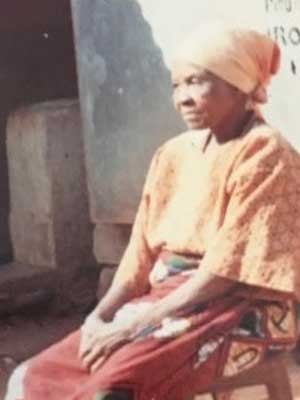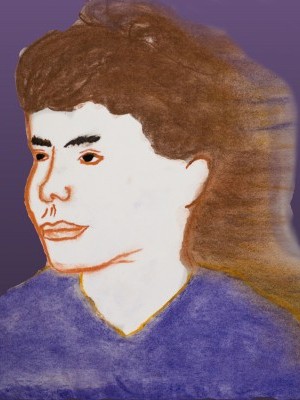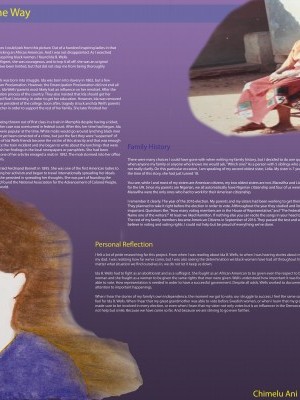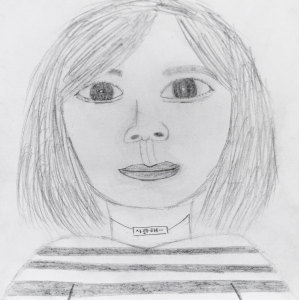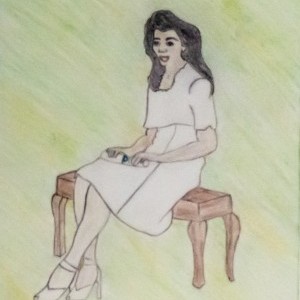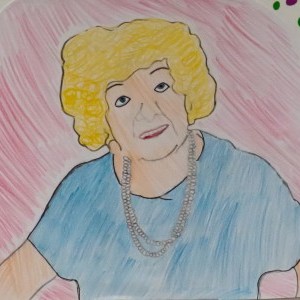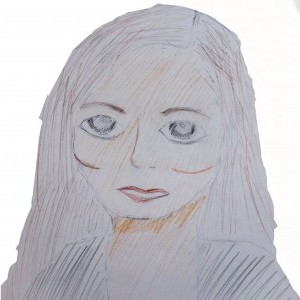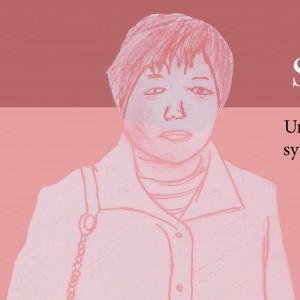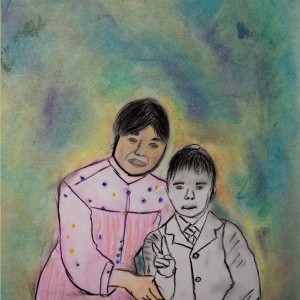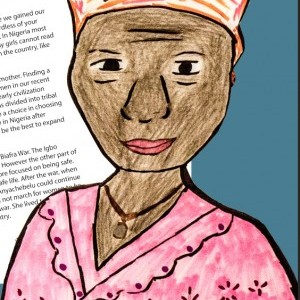Chimelu Ani
The Stony Brook School | Stony Brook, NY | 9-12th Grade
Inspirational Family Member
My Sister Lidia
There were many choices I could have gone with when writing my family history, but I decided to do one quite close to me, the story of my sister. It’s around this time when anyone in my family or anyone who knows me would ask, “Which one?” As a person with five siblings, who all happen to be female, just saying the word “sister” does not really clarify. On this particular occasion, I am speaking of my second oldest sister, Lidia. My sister is seven years older than me. At the moment she is twenty-one, but at the time of this story, she had just turned eighteen.
You see, while I and most of my sisters are American citizens, my two oldest sisters are not. Maravilha and Lidia were born in Angola while my dad was there working for the UN. Since my parents are Nigerian, we all automatically have Nigerian citizenship and four of us were born in America, giving us American citizenship. Lidia and Maravilha were the only ones who had to work for their American citizenship.
I remember it clearly, the year of the 2016 election. My parents and my sisters had been working to get their citizenship for years, and this was the year of the test. They planned to take it right before the election in order to vote. All throughout the year, they studied and listened to tapes. They learned facts I didn’t even know were important. Questions like, “How many voting members are in the House of Representatives” and “The Federalist Papers supported the passage of the U.S. Constitution. Name one of the writers.” At least we liked Hamilton. If nothing else, you can recite the songs in your head to remember a few dates. The rest of my family members became American citizens in September of 2016. They passed the test and became registered voters. In my family, we strongly believe in voting and voting rights. I could not help but be proud of everything we’ve done.
Historical Figure I Admire
Ida B. Wells Barnett
Once I saw that picture, I knew. There were only five choices I could pick from out of a hundred inspiring ladies in that picture; I knew I would need to represent my people by picking an African American, and I was not disappointed. As I searched through my choices, looking at more and more stories of inspiring black women, I found Ida B. Wells. Ida B. Wells was everything I was looking for. She was intelligent, she was courageous, and to top it all off, she was an original founder of the NAACP. What more could I ask for? I may have been limited, but that did not stop me from being thoroughly impressed.
Like many other African Americans in her time, Ida B. Wells was born into struggle. Ida was born into slavery in 1862, but a few months after her birth she was set free by the Emancipation Proclamation. However, the Emancipation Proclamation did not end all injustice, which she spent most of her life fighting against. Ida Wells’ parents most likely had an influence on her mindset. After the slaves were freed, her parents were involved in the restoration process of the country. They also insisted that Ida should get her education. This led her to go to Shaw University, now called Rust College, in order to get her education. However, Ida was removed from the university after getting into an argument with the president of the college. Soon after, tragedy struck and Ida’s parents and brother were taken by yellow fever. Ida became a teacher in order to support the rest of her family. She later finished her education at Fisk University.
It was 1884 when Wells began her life of activism. Upon being thrown out of the first class train in Memphis despite having a ticket, she sued the train company. Wells won in state court, but her case was overturned in federal court. After this, her time had begun, Ida became skeptical about the lynchings of black men that were popular at the time. White mobs would go around lynching black men who were in jail awaiting their trials. Most of them had not yet been convicted of a crime, but just the fact that they were “suspected” of one was enough evidence for the public to kill them. One of Ida Wells’ friends became the victim of this atrocity and that was enough for Ida to investigate them. Ida had been writing ever since the train incident and she began to write about the lynchings that were happening. She would investigate local killings and publish her findings in local newspapers and pamphlets. She had been investigating and publishing these things for years when one of her articles enraged a mob in 1892. The mob stormed into her office and destroyed her equipment, running her out of Memphis.
Ida B. Wells moved to Chicago after that and married Ferdinand Barnett in 1895. She was one of the first American ladies to keep her original name. Wells had children while continuing her activism and began to travel internationally spreading her ideals. She was criticized by white suffragists of her time, but she persisted in spreading her thoughts. She was part of founding the National Association of Colored Women’s Club and helped found the National Association for the Advancement of Colored People. Ida Wells died in 1931 after making much impact on the world.
What the Project Means to Me
I felt a lot of pride researching for this project. From when I was reading about Ida B. Wells, to when I was hearing stories of my family from my dad, I was realizing how far we’ve come, but I was also seeing the determination we black women have had all throughout history. No matter what situation we find ourselves in, we do not let it keep us down.
Ida B. Wells had to fight as an abolitionist and as a suffragist. She fought as an African American to be given even the respect to be treated as a woman and she fought as a woman to be given the same rights that men were given. Wells understood how important it was for women to be able to vote, how representation is needed in order to have a successful government. Despite all odds, Wells worked to document and bring attention to important happenings.
When I hear stories of my family’s own independence, the moment we got to vote, our struggle to success, I feel the same sort of pride as I feel for Ida B. Wells. When I hear that my great grandmother was able to vote before Swedish women, or when I learn that my grandparents made sure to be involved in every election, or even when I learn that my sister not only votes but is an influencer in the Democratic Party, I cannot help but smile because we have come so far and because we are striving to go even further.
Explore the Archive
More From This Class
Click on the thumbnails below to view each student's work.Deadline Extended
There's still time to join Women Leading the Way.
Become a part of our storytelling archive. Enroll your class today.
Join the Project

